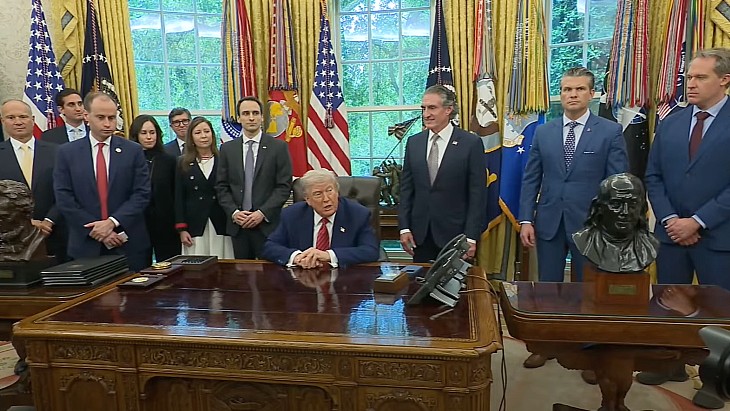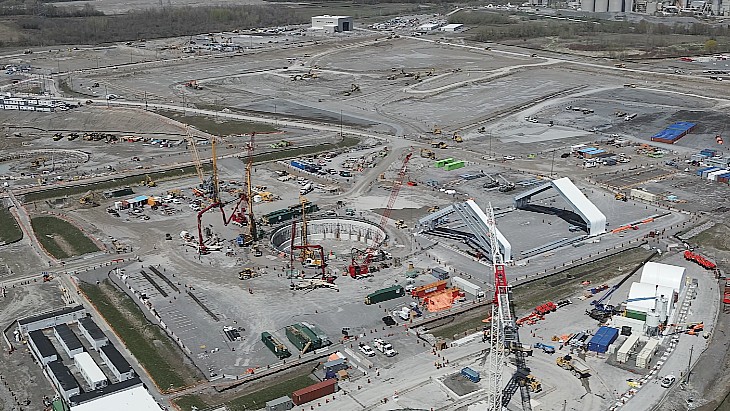Energy Fuels suspends uranium transports in response to Navajo challenge
.jpg)
Late last year, Energy Fuels announced that it had started production at the Pinyon Plain mine in Arizona, as well as at the La Sal project in Eastern Utah, with ore from those mines to be stockpiled at its White Mesa mill in Utah for processing. For Pinyon Plain, this involves trucking material over Navajo Nation lands.
On 31 July, Navajo Nation President Buu Nygren issued an executive order banning the transport of radioactive material through the Navajo Nation without a prior agreement, citing Navajo laws regarding the transport of radioactive materials in the Navajo Nation Natural Resources Protection Act of 2005 and the Navajo Nation’s 2012 Radioactive and Related Substances, Equipment, Vehicles, Persons and Materials Transportation Act. The order will last for six months. Nygren said the order had been signed after Energy Fuels the previous day transported an estimated 50 tonnes of uranium ore through tribal lands without providing the notice required under the 2012 law.
Energy Fuels had informed federal, state, county, and tribal officials more than 10 days earlier about the legal requirements, safety, emergency response, and the imminent shipping of uranium ore, though without giving a specific date.
In the company's second quarter earnings call on 5 August, CEO Mark Chalmers said the company believes it has the necessary licences and rights for the shipments but respects the Navajo Nation's concerns and has voluntarily suspended shipments. Both sides are "looking for a resolution" on moving forward, he said.
Energy Fuels and its predecessor companies had completed uranium shipments across the reservation lands for many decades up to the last shipment, which took place in 2022, without a single incident, Chalmers said, and had worked with members of the Navajo nation, including arranging visits to the mines and mill to witness loading and unloading "so that they were comfortable with those shipments." According to the company's presentation, around half of the employees at the White Mesa mill are Navajo and Native American.
.jpg) President Nygren wants the legacy of Cold War era uranium mining operations on Navajo land to be addressed (Image: Navajo Nation Office of the President)
President Nygren wants the legacy of Cold War era uranium mining operations on Navajo land to be addressed (Image: Navajo Nation Office of the President)
Legacy issues
One of the reasons for the Navajo Nation's concerns is a "long legacy of uranium issues that have nothing to do with Energy Fuels - most were created by legacy arrangements with the US Government during the Cold War," he said, but the company was working with the Navajo Nation to address these concerns. "The biggest issue … is they want safe transport of materials across the Navajo nation, and we absolutely respect that. We absolutely respect that it has to be done safely - we have done it over time, and we plan to sit down with them to make sure that it is safely transported," he said.
Nygren's office also highlighted the legacy of Cold War uranium mining activities in a 2 August blog post, which said the President's deployment of tribal police to intercept Energy Fuels' uranium transport trucks had been "because of his priority to clean up abandoned uranium mines and mills."
Between 1944 and 1986, more than 30 million tonnes of uranium ore was extracted from the Navajo Nation for the US nuclear weapons programme, but the legacy of those operations - including radioactive contamination impacts on Navajo miners and their families - has not been adressed.
"Cleanup of these 500 abandoned uranium mine and mill sites is a major priority of my administration," President Nygren said. "It is why I deployed the Navajo Nation police to block what I think is the illegal transport of uranium ore across the Navajo Nation. Cleanup must happen first, and the trauma associated with premature sickness and death from the legacies of it."
Ramp up continues
Energy Fuels plans to ramp up ore production from Pinyon Plain, La Sal and Pandora to a production run-rate of around 1.1 to 1.4 million pounds of U3O8 per year by late-2024. The transport moratorium is not expected to hold back development work at Pinyon Plain, Chalmers said.
Alternative transport routes exist and "will all be part of the discussions", he said. "But the route that we have across the reservation is a route that has been studied extensively and it is really the best route, and we intend to continue down that path, but let us continue our discussions with the Navajo nation because, again, we are respectful of their concerns… let's figure out how to alleviate those concerns."
The company expects to produce a total of 150,000-500,000 pounds U3O8 (57.7- 192.3 tU) during 2024 from stockpiled alternate feed materials and newly mined ore.
_49098.jpg)
_57190.jpg)
_70526.jpg)
_75453.jpg)







